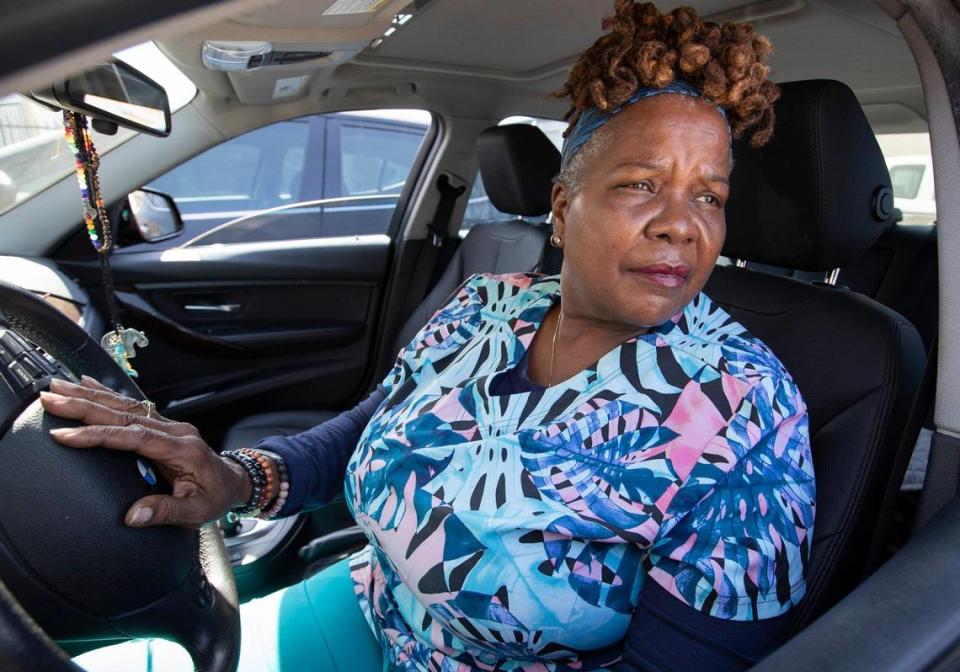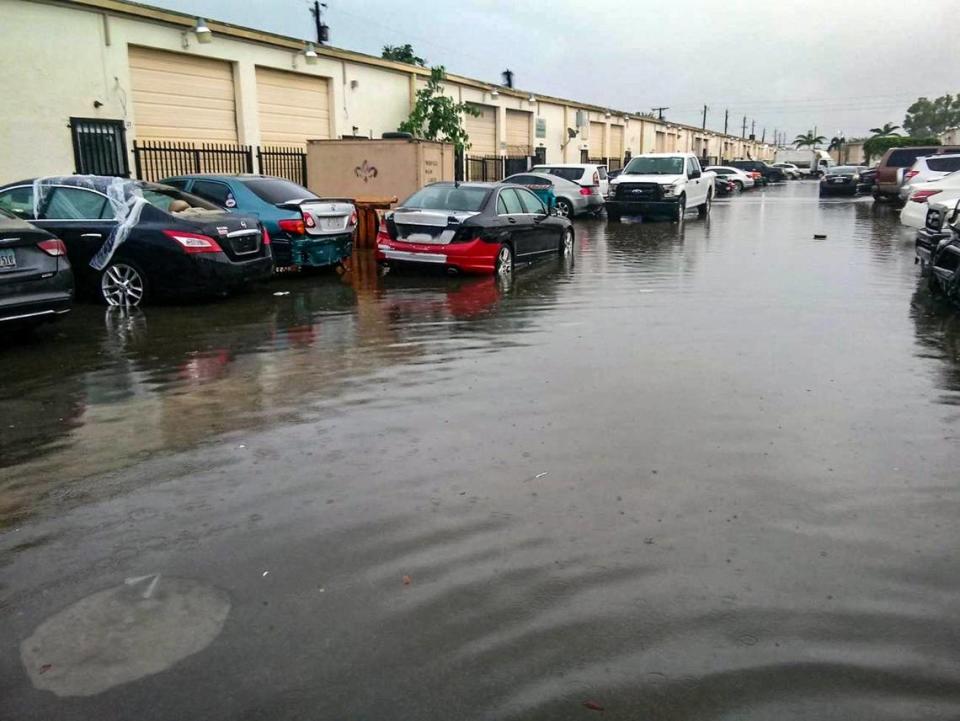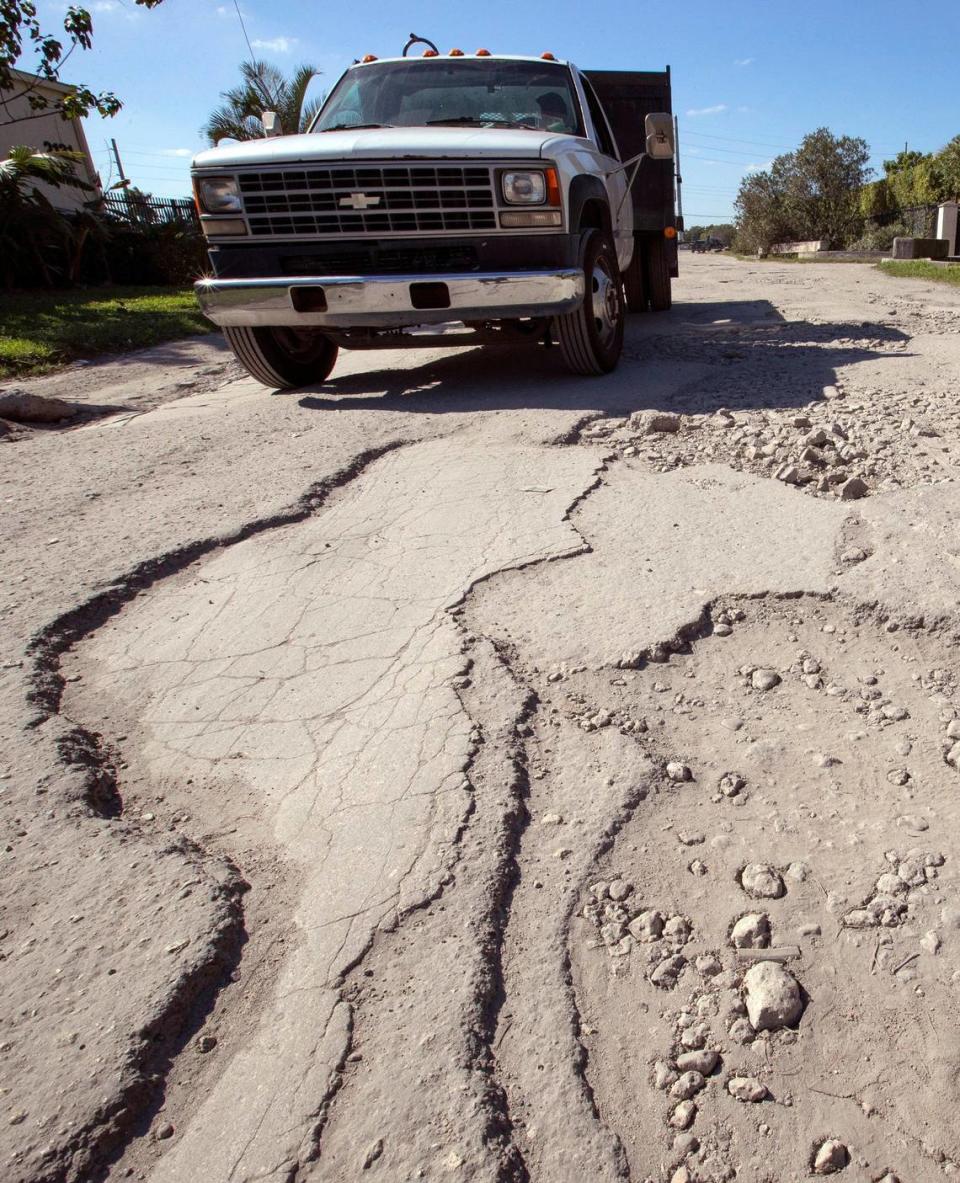‘Roads are better in third-world countries’: Even Uber won’t use this Opa-locka road
The Road to Hell is not paved with good intentions. In fact, it is barely paved at all. It is a cratered, flooded mess. It is a graveyard for front axles. It could be the worst road in Miami. Business people in the hundreds of warehouses lining Northwest 141st Street say they are losing customers who refuse to drive on it — and Uber won’t come near it.
They blame the city of Opa-locka for not repairing the road and drainage system.
“Our customers don’t want to come here anymore,” said Delroy Lowe, manager of Lawrence Auto Repair. “You tell a person where your shop is located, they hear the address and they say, ‘Oh, no! No, no! You guys do good work but I cannot drive on that street. I’ll need even more repairs if I drive on that street.’”
Ronald Gavsie, an Opa-locka business owner for 32 years, has watched the road deteriorate and turn into a muddy hazard during rainy season.
“When these holes are filled with water you might as well have diving boards and No Wake zones out here,” said Gavsie, president of Equity Realty Corp. “The only way to navigate it is to crawl in and out of the holes at 3-4 mph or drive on the sidewalks. Roads are better in third-world countries.”
Dianne McCloud said she’s spent hundreds of dollars to fix damage to her car.
“I’ve had to replace my front end, buy new tires,” said McCloud, owner of Marcel’s Cremations, where ‘Service is our blessing.’ “I would never come this way if I didn’t have to work here. I want to move. It’s been in bad shape for eight, nine years and we’ve complained and nothing changes.”

The street is impassable for all but the brave or foolhardy. Yet traffic is steady because of the number of businesses situated along it. Sedans attempt to daintily weave around the holes but almost every square inch is deeply rutted, as if mutant groundhogs with jackhammer teeth have been burrowing into the pavement. Pickup trucks try to maneuver through the rocky terrain but it is so violently bumpy drivers risk separating a shoulder or cracking a molar. Even huge tractor-trailer rigs are no match for the cursed road as they thud, clunk, scrape and rattle their way to the end. It’s the perfect place to test drive a tank, though.
Northwest 141st Street is a prime example of what ails Opa-locka, a poor city that, given its location, airport and network of roadways, could be a vigorous industrial-commercial hub of South Florida, but is paralyzed by city leaders’ failure to fix its collapsing infrastructure. A history of corrupt government, indifferent maintenance, overwhelmed storm drains and backed-up sewer lines makes the city unappealing to businesses and miserable for residents.
How bad are your neighborhood roads? Tell us your local transportation horror stories
A financial emergency was declared in June 2016 and the city was placed under control of a state oversight board, which monitors its spending.
“The city is so corrupt, inept and broke that the people mismanaging it have ruined it,” Gavsie said. “Money disappears or gets misappropriated. They let things run down, they don’t invest, they do a cheap patch job and it washes away within a month.”
Flooding is a major problem along Northwest 141st Street and the connecting lanes lined with warehouse bays. Wading boots are standard attire during rainy season when water is at ankle level.

“My shop flooded three weeks ago. It’s like a sea,” Lowe said, showing photos that he took after a December rainy period. “We don’t expect to wear rubber boots at work where I come from in Jamaica. Why do we have to wear them here?”
Brandon Michaels’ B&P Auto garage also flooded around Christmas. The merchandise he had prepared for shipping got soaked and he had to repack everything in new boxes, squeegee the water out and run a blower for two days.
“If one car drives fast through here when there’s standing water you get a tsunami in your shop,” said Michaels, adding that his rent has increased from $800 to $1,025 despite the inadequate upkeep. “Luckily no one has gotten electrocuted. Thank God I have a truck, but even my truck bottoms out. People with normal cars, I feel sorry for them. Sports cars are low to the ground and expensive. It’s very frustrating and aggravating.”
McCloud has to place sandbags around her office and garage doors when it rains.
Bill Sheffield, owner of Bill’s Backhoe Service for 39 years and “tired of having my coffee spill into my lap,” has taken it upon himself to fill potholes with pea rock and lime rock using his own front loader. He’s received donations from a few neighboring business people.
“It’s only temporary because the heavy trucks beat the rock down into particles and then you’re gagging on dust and have to keep your overhead doors closed,” said Sheffield, who remembers when Opa-locka was “a nice place with nice streets.” He’s located on Northwest 139th Street, which is in marginally better shape than 141st Street. “These roads have gotten too thin and the drains are clogged. There was a plan to totally rebuild and put in new water and sewer lines but I’ve been hearing that for 30 years.”

One longtime property owner who did not want his name published has not only lost contracts but 10 secretaries over the years who have quit rather than endure commuting across an obstacle course.
“It’s a humiliating situation,” he said.
Jonathan Loredo, who works at Best Motors, said he wrote a plea to President Donald Trump.
“I said please, help us fix our streets and stop this nasty flooding but I don’t know if he got it,” Loredo said. “I’ve worked in Allapattah, Doral and other suburbs and no place is as messed up as Opa-locka. I’ve been told Opa-locka is untouchable. It’s the United States, you expect things to get fixed, but not here.”
In Opa-locka, which has one of the highest property tax rates in Miami-Dade County, money that should be budgeted for improvements is often squandered, the state Auditor General found in its review of city finances. The June 2019 report discovered “numerous instances of potential fraud, waste, and abuse. For some of our findings, the amount of resources lost due to noncompliance or inadequate accountability was not quantifiable; however, we identified questioned costs or potential avoidable losses totaling nearly $5 million, collectively, for the City and the Community Redevelopment Agency.”
Opa-locka has had opportunities and funding for capital improvement projects in the past, but most were never completed, said former five-time city manager and Community Redevelopment Agency director Newall Daughtrey, who is now the assistant town manager for Pembroke Park.
“Because there is no drainage, the water has nowhere to go and it destroys streets. The city has known about these problems since I was assistant city manager in 1973,” Daughtrey said. “We knew from an engineering study in 2002 about 15 target projects that would cost $97 million. Ten years later when I came back as CRA director, only one had been finished and the cost to do the rest had gone up to $300 million because the conditions had gotten worse.
“The city has lacked the political will to do right by its citizens. They gave developers permits to build without putting in proper road beds and drainage. They didn’t assess commercial property owners for the improvements that needed to be made. As an avoidable consequence, those streets have been eaten up. Unfortunately, I know Opa-locka government and irresponsible is the nicest thing I can say about it.”
Opa-locka Mayor Matthew Pigatt said his goal is to reform the dysfunctional city, and fixing streets is a priority. At the Jan. 8 commission meeting, the city decided to seek bids “for civil engineering services to develop a plan of action to address infrastructure improvements throughout the city,” he said. “We also approved temporary street repairs on 139th Street and plan to do the same to 141st Street with the upcoming budget amendment.”

